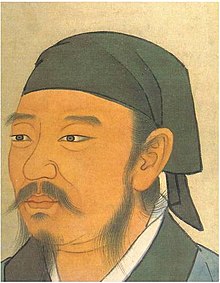Xun Kuang
Xun Kuang 荀況 | |
|---|---|
 Portrait of Xunzi | |
| Born | c. 310 BCE |
| Died | c. 235 BCE (aged 74–75) State of Chu |
| Occupation | Confucian philosopher, writer |
| Opponent(s) | Mencius, Zisi |
| Xun Kuang | |||
|---|---|---|---|
| Chinese | 荀況 | ||
| |||
| Alternative Chinese name | |||
| Traditional Chinese | 荀子 | ||
| Simplified Chinese | 荀子 | ||
| |||
| Part of a series on |
| Confucianism |
|---|
 |
Xun Kuang (Chinese: 荀況; pinyin: Xún Kuàng [ɕy̌n kʰwâŋ]; c. 310 – c. 235 BCE, alt. c. 314 – c. 217 BCE),[1] also widely known as Xunzi (Chinese: 荀子; pinyin: Xúnzǐ; Wade–Giles: Hsün-tzu, "Master Xun"), was a Chinese Confucian philosopher and writer who lived during the Warring States period and contributed to the Hundred Schools of Thought. A book known as the Xunzi is traditionally attributed to him. His works survive in an excellent condition, and were a major influence in forming the official state doctrines of the Han dynasty,[2] but his influence waned during the Tang dynasty relative to that of Mencius.[3]
Xunzi discusses figures ranging from Confucius, Mencius, and Zhuangzi, to Linguists Mozi, Hui Shi and Gongsun Long and "Legalists" Shen Buhai and Shen Dao.[4] He mentions Laozi as a figure for the first time in early Chinese history,[5] and makes use of Taoist terminology, though rejecting their doctrine.[6]
Life[]
Xunzi was born Xun Kuang. Some texts recorded his surname as Sun (孫) instead of Xun, either because the two surnames were homophones in antiquity or because Xun was a naming taboo during the reign of Emperor Xuan of Han (73–48 BCE), whose given name was Xun. Herbert Giles and John Knoblock both consider the naming taboo theory more likely.[7][8]
Nothing is known of his lineage, and the early years of Xunzi's life are shrouded in mystery. Accounts of when he lived conflict; he is said to have met a King Kuai of Yan during the time of Mencius, while Liu Xiang states that he lived more than a hundred years after Mencius. The Sima Qian records that he was born in Zhao, and Anze County has erected a large memorial hall at his supposed birthplace. It is recounted that at the age of fifty he went to the state of Qi to study and teach at the Jixia Academy. The Shi Ji states that he became a member of the academy during the time of King Xiang of Qi, discounting the story of his being a teacher of Han Fei, but its chronology would give him a lifetime of 137 years.
After studying and teaching in Qi, Xunzi is said to have visited the state of Qin, possibly from 265 BCE to 260 BCE,[9] and praised its governance, and debated military affairs with Lord Linwu (臨武君) in the court of King Xiaocheng of Zhao. Later, Xunzi was slandered in the Qi court, and he retreated south to the state of Chu. In 240 BCE Lord Chunshen, the prime minister of Chu, invited him to take a position as Magistrate of Lanling (蘭陵令), which he initially refused and then accepted. However, Lord Chunshen was assassinated In 238 BCE by a court rival and Xunzi subsequently lost his position. He retired, remained in Lanling, a region in what is today's southern Shandong province, for the rest of his life and was buried there. The year of his death is unknown,[10][11] though if he lived to see the ministership of his supposed student Li Si, as recounted, he would have lived into his nineties, dying shortly after 219 BCE.[12]
Philosophy[]
Xunzi witnessed the chaos surrounding the fall of the Zhou dynasty and rise of the Qin state which upheld "doctrines focusing on state control, by means of law and penalties" (Chinese Legalism).[3] Like Shang Yang, Xunzi believed that humanity's inborn tendencies were evil and that ethical norms had been invented to rectify people. His variety of Confucianism therefore has a darker, more pessimistic flavour than the optimistic Confucianism of Mencius, who tended to view humans as innately good, though like most Confucians he believed that people could be refined through education and ritual.[13][14] However, he believed that only an elite could accomplish this.[15] He adapted Confucianism to the ideas of the Mohists and Legalists.[16] Therefore, unlike other Confucians, Xunzi allowed that penal law could play a legitimate, though secondary, role in the state.[17]
He rejects the Book of Lord Shang and Zhuangzi's claims that the way changes with the times, saying the way had been invented by the sages.[13] To this end he seems to have taken up the Mohists' argumentative strategies and conception of models (Fa) (which the Legalists had also taken up), saying "the Ru model themselves after the former kings".[13] Unlike the Legalists, he places little emphasis on general rules, advocating the use of particular examples as models.[15]
Ultimately, he refused to admit theories of state and administration apart from ritual and self-cultivation, arguing for the gentleman, rather than the measurements promoted by the Legalists, as the wellspring of objective criterion.[16] His ideal gentleman (junzi) king and government, aided by a class of erudites (Ru), are "very close to that of Mencius", but without the tolerance of feudalism (since he rejected hereditary titles and believed that an individual's status in the social hierarchy should be determined only by their own merit).[18]
Notes[]
- ^ Knechtges & Shih (2014), p. 1757.
- ^ John H. Knoblock. Early China, Vol. 8 (1982–83), p. 29. The Chronology of Xunzi's Works. https://www.jstor.org/stable/23351544
- ^ Jump up to: a b de Bary, William Theodore; Bloom, Irene, eds. (1999). Sources of Chinese Tradition: From Earliest Times to 1600. 1. New York: Columbia University Press. pp. 159–160. ISBN 978-0231109390.
- ^ Karyn Lai 2017. p.55. An Introduction to Chinese Philosophy. https://books.google.com/books?id=3M1WDgAAQBAJ&pg=PA55
- ^ Tae Hyun KIM 2010 p.18, Other Laozi Parallels in the Hanfeizi
- ^ Robins, Dan, "Xunzi", 8. Epistemology, The Stanford Encyclopedia of Philosophy (Spring 2017 Edition), Edward N. Zalta (ed.), https://plato.stanford.edu/archives/spr2017/entries/xunzi/
- ^ Giles, Herbert (1898). A Chinese Biographical Dictionary. Bernard Quaritch (London). p. 315.
hsun kuang.
- ^ Knoblock, John (1988). Xunzi: a translation and study of the complete works. Stanford, CA: Stanford University Press. p. 239. ISBN 0804714517.
- ^ John H. Knoblock. Early China, Vol. 8 (1982–83), p.34. The Chronology of Xunzi's Works. https://www.jstor.org/stable/23351544
- ^ Watson, Burton (2003). Xunzi: Basic Writings. Columbia University Press. pp. 2, 120, 132–133, 145–146, 148, 154, 163–165, 170, 174. ISBN 978-0231129657.
- ^ David R. Knechtges and Taiping Chang 2014. p.1759. Ancient and Early Medieval Chinese Literature (vols. 3 & 4). https://books.google.com/books?id=OWLPBAAAQBAJ&pg=PA1759
- ^ John H. Knoblock. Early China, Vol. 8 (1982–83), p.34. The Chronology of Xunzi's Works. https://www.jstor.org/stable/23351544
- ^ Jump up to: a b c Robins, Dan, "Xunzi", 2. The Way of the Sage Kings, The Stanford Encyclopedia of Philosophy (Spring 2017 Edition), Edward N. Zalta (ed.), https://plato.stanford.edu/archives/spr2017/entries/xunzi/
- ^ Manso, William C. (1987). "Incipient Chinese Bureaucracy and Its Ideological Rationale: The Confucianism of Hsün Tzǔ". Dialectical Anthropology. 12 (3): 271–284. JSTOR 29790241.
- ^ Jump up to: a b Robins, Dan, "Xunzi", 4. Education and Punishment, The Stanford Encyclopedia of Philosophy (Spring 2017 Edition), Edward N. Zalta (ed.), https://plato.stanford.edu/archives/spr2017/entries/xunzi/
- ^ Jump up to: a b John Knoblock 1990. p.172. Xunzi: Books 7-16. https://books.google.com/books?id=DNqmAAAAIAAJ&pg=PA172
- ^ (R. Eno), 2010 p.1. LEGALISM AND HUANG-LAO THOUGHT. Indiana University, Early Chinese Thought [B/E/P374]. http://www.indiana.edu/~p374/Legalism.pdf
- ^ Burton Watson 2003. Xunzi: Basic Writings. https://books.google.com/books?id=0SE2AAAAQBAJ&pg=PA6
- Robins, Dan, "Xunzi", 2. The Way of the Sage Kings, The Stanford Encyclopedia of Philosophy (Spring 2017 Edition), Edward N. Zalta (ed.), https://plato.stanford.edu/archives/spr2017/entries/xunzi/
References[]
- Cua, A.S. (1985). Ethical Argumentation: A Study in Hsün Tzu's Moral Epistemology. Honolulu: University of Hawaii Press. ISBN 0-8248-0942-4.
- Knechtges, David R.; Shih, Hsiang-lin (2014). "Xunzi 荀子". In Knechtges, David R.; Chang, Taiping (eds.). Ancient and Early Medieval Chinese Literature: A Reference Guide, Part Three. Leiden: Brill. pp. 1757–65. ISBN 978-90-04-27216-3.
- Loewe, Michael (1993). "Hsün tzu 荀子". In Loewe, Michael (ed.). Early Chinese Texts: A Bibliographical Guide. Berkeley: Society for the Study of Early China; Institute of East Asian Studies, University of California Berkeley. pp. 178–88. ISBN 1-55729-043-1.
- Munro, Donald J. (2001). The Concept of Man in Early China. Ann Arbor, MI: University of Michigan. ISBN 978-0892641512.
- Schwartz, Benjamin I. (1985). The World of Thought in Ancient China. Cambridge, MA.: Harvard University Press. ISBN 0-674-96190-0.
External links[]
| Wikiquote has quotations related to: Xun Kuang |
- 310s BC births
- 3rd-century BC Chinese people
- 3rd-century BC deaths
- 3rd-century BC Chinese philosophers
- Chinese Confucianists
- Chinese ethicists
- Qi (state)
- People from Linfen
- Philosophers from Shanxi
- Philosophers of language
- Writers from Shanxi
- Zhou dynasty essayists
- Zhou dynasty philosophers